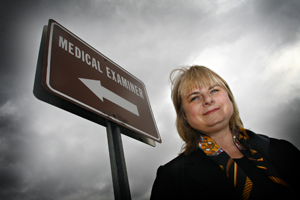Medical Examiner Seeks Justice for Crime Victims
 |
| Dr. Yvonne Milewski, chief medical examiner for Suffolk County, New York, has traveled to places such as Croatia and Kosovo as a volunteer for Physicians for Human Rights. |
Forensic pathology is oftentimes about life as much is it is about death. As a medical examiner, Yvonne I. Milewski, MD ’86, uses her expertise to provide answers for families and friends of the deceased as well as reveal key forensic evidence in the investigation of deaths due to unnatural and frequently violent causes. The ability to offer a voice for those no longer able has given Dr. Milewski immense satisfaction in her work as well as taken her around the world as a volunteer for Physicians for Human Rights (PHR).
Since 1996 Dr. Milewski has performed autopsies on recovered human remains—frequently buried in mass graves—in places such as Croatia, Kosovo, and Nigeria. Uncovering signs of torture to murder, this Northwestern alumna has freely offered her time so that justice can some day be served on behalf of victims. “I enjoy testifying in front of juries and judges and helping to establish a historical record,” she says. “It can be difficult and challenging, but if the truth isn’t established, it will slip away unrecorded.”
Serving as an ideal expert witness, Dr. Milewski has fulfilled this role both in the United States and abroad. For example, she testified before the United Nation’s International Criminal Tribunal for the former country of Yugoslavia in its genocide case against the deposed late Serbian President Slobodan Milosevic. Remarks Dr. Milewski, “I have traveled several times to The Hague [Netherlands] to provide evidence.”
Serving in an advisory role to PHR, Dr. Milewski also helped give the family of Nigerian activist Ken Saro-Wiwa—who fought for human rights and environmental causes in his homeland—some closure. The jailed author, along with eight other activists, was convicted of murder in 1995 and, without any appeals process, quickly executed by the Nigerian government. The bodies were secretly buried and seemingly lost forever until 2004 when a PHR-sponsored forensic team identified Saro-Wiwa’s remains and those of some of his compatriots.
In October 2006 PHR honored Dr. Milewski in Boston at the group’s 20th anniversary celebration. She was among 20 health care professionals recognized by the organization for their dedication to preserving the health and rights of all people.
Dr. Milewski has provided her expertise outside of this country in less than ideal conditions—she conducted autopsies in a bombed out clothing factory during her first stint in Bosnia—and contributed to the recovery efforts in New York after the September 11th terrorist attacks. As deputy chief medical examiner in charge of the Bronx from 1998â2002, Dr. Milewski joined some 30 forensic pathologists from New York’s five borough offices in identifying human remains recovered at the World Trade Center (WTC).
In addition to their regular “day” jobs, the city’s medical examiners processed more than 20,000 specimens found and removed from the site of the destroyed WTC’s twin towers. The forensic pathology teams turned to DNA analysis for an overwhelming number of the identifications, according to Dr. Milewski. Enduring long hours and encountering challenges in quickly identifying victims, Dr. Milewski relied on her volunteer experience abroad to give her strength and found solace in tangibly employing her skills to overcome some of the horror of that tragic day.
Captivated by spy and detective stories as a young girl, Dr. Milewski’s attraction to forensic pathology predated the current proliferation of CSI: Crime Scene Investigation television dramas. In fact, she hasn’t even seen an episode; her favorite TV program is Law & Order, a show that her attorney husband, Kevin Dooley, won’t watch but one that appeals to Dr. Milewski’s interest in and professional contact with the legal system.
“A career in forensic pathology is very interesting, both scientifically and medically, ” says Dr. Milewski. “Despite the usual wisecracks that our patients don’t talk back, I spend most of my time talking to people from family members and survivors to police officers and attorneys. Every dead body has a family who wants to know what has happened.”
In March Dr. Milewski became the first female chief medical examiner for Suffolk County in New York, where she oversees 104 employees and an annual budget of $8.9 million. Says Dr. Milewski, who relocated from Houston for this new opportunity, “We have the extreme good fortune to have two top-notch, in-house, certified laboratories—a toxicology lab as well as a civilian-run crime laboratory, which is unique. Traditionally in this country crime labs have been run by police departments.”
While the months ahead involve adjusting to a new home and job, Dr. Milewski does plan to continue her humanitarian work when the time is right. “In Iraq and Afghanistan, we know horrible events have occurred, but the conditions are unsafe right now to send forensic pathology teams into these areas,” she says. “In the early days in the Balkans, for example, some mass graves were rigged with land mines. While some relatives may be shortchanged by not knowing where their loved ones are buried, those bodies—for now—are at peace exactly where they are.”
(Excerpted from an article appearing in the Spring 2007 issue of Ward Rounds.)






